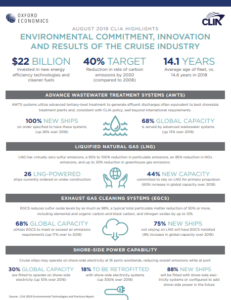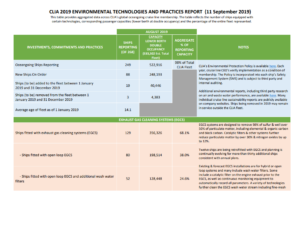The Cruise Lines International Association (CLIA) published its 2019 Environmental Technologies and Practices Report, according to which cruise lines have provided up to $22 billion in vessels equipped with energy-efficient technologies and cleaner fuels.
Specifically, the report highlights that
- LNG Fuel: 44% of new build capacity will rely on LNG fuel for primary propulsion, a 60% increase in overall capacity compared to last year.
- Exhaust Gas Cleaning Systems (EGCS): More than 68% of global capacity utilizes EGCS to meet or exceed air emissions requirements representing an increase in capacity of 17% compared to last year. Additionally, 75% of non-LNG new builds will have EGCS installed, an increase in capacity of 8% compared to last year.
- Advanced Wastewater Treatment Systems: 100% of new ships on order are specified to have advanced wastewater treatment systems, increased by 16% in comparison to 2018.
- Shore-side Power Capability: In port, cruise ships are increasingly equipped with the technology to allow delivery of shoreside electricity, thus allowing engines to be switched off.
- Fleet Age: The average age of the CLIA cruise lines fleet is 14.1 years compared to 14.6 the prior year.
Michael Thamm, Chairman of CLIA Europe and Group CEO of Costa Group and Carnival Asia stated
While cruise ships comprise far less than 1% of the global maritime community, cruise lines are at the forefront in developing responsible tourism practices and innovative technologies… The entire shipping industry benefits from early adoption of innovative technologies by cruise lines—many of which did not exist five to 10 years ago such as exhaust gas cleaning systems (EGCS)…
In addition, Adam Goldstein, Chairman of CLIA Global and Vice Chairman of Royal Caribbean Cruises Ltd, commented that the cruise sector is innovative when it comes to environmental protection, and is committed to reducing its carbon emissions by 40% by 2030/
It’s a challenging goal, but the CLIA Cruise Lines fleet is working diligently to meet this aggressive target.
… concluded Goldstein.
Back in August NABU presented its cruise ship ranking 2019. according to which a small part of the cruise fleet is becoming ‘cleaner’, whereas it continues to rely on heavy fuels. Based on these findings, NABU CEO Leif Miller, stated that ‘the cruise ship industry’s failure to embrace climate protection is a slap in the face of our youth.’
To explore more, click on the PDF herebelow

































































